Questionnaire Related to Sleep Study
VerifiedAdded on 2022/08/20
|7
|1255
|44
AI Summary
Contribute Materials
Your contribution can guide someone’s learning journey. Share your
documents today.
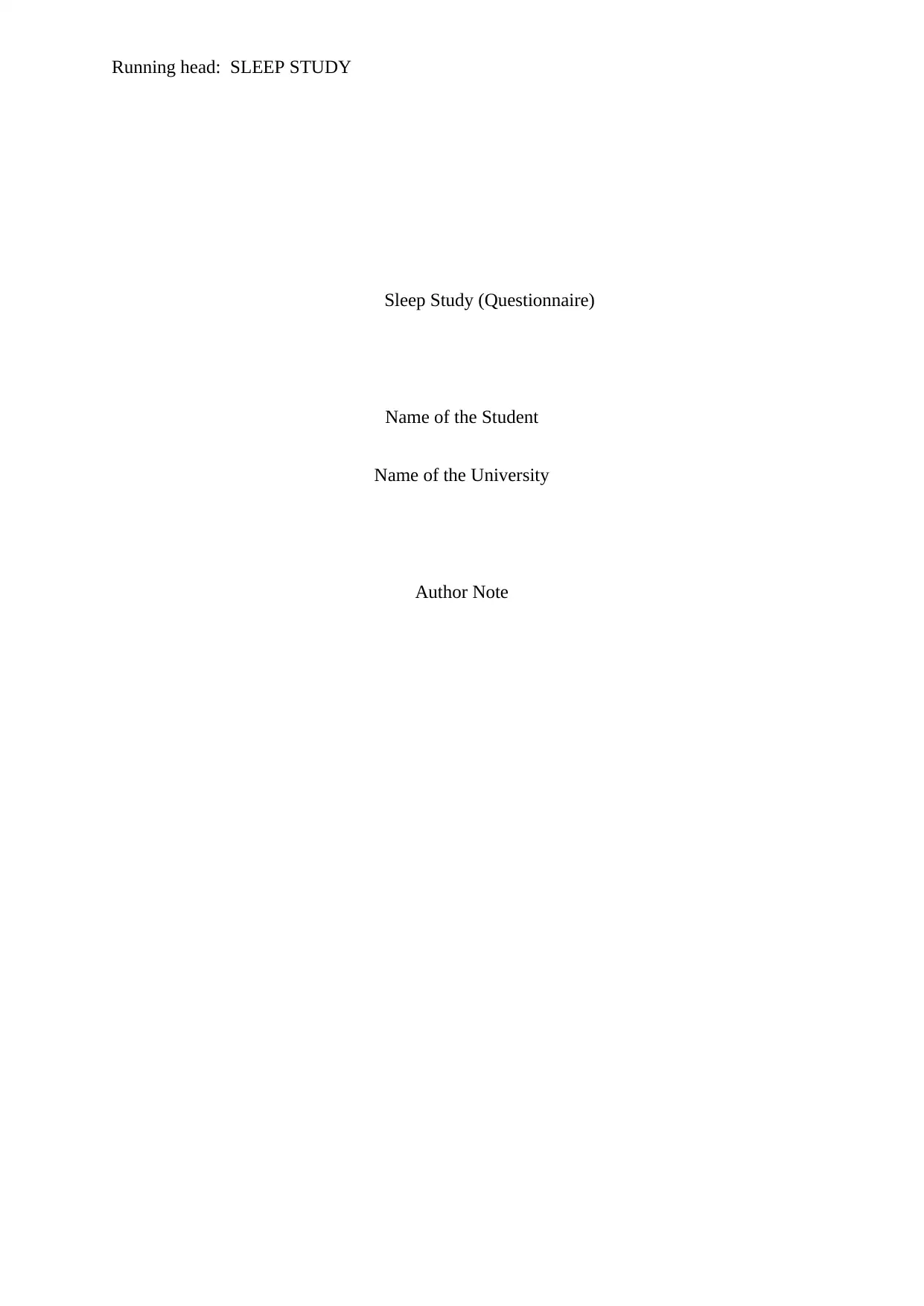
Running head: SLEEP STUDY
Sleep Study (Questionnaire)
Name of the Student
Name of the University
Author Note
Sleep Study (Questionnaire)
Name of the Student
Name of the University
Author Note
Secure Best Marks with AI Grader
Need help grading? Try our AI Grader for instant feedback on your assignments.
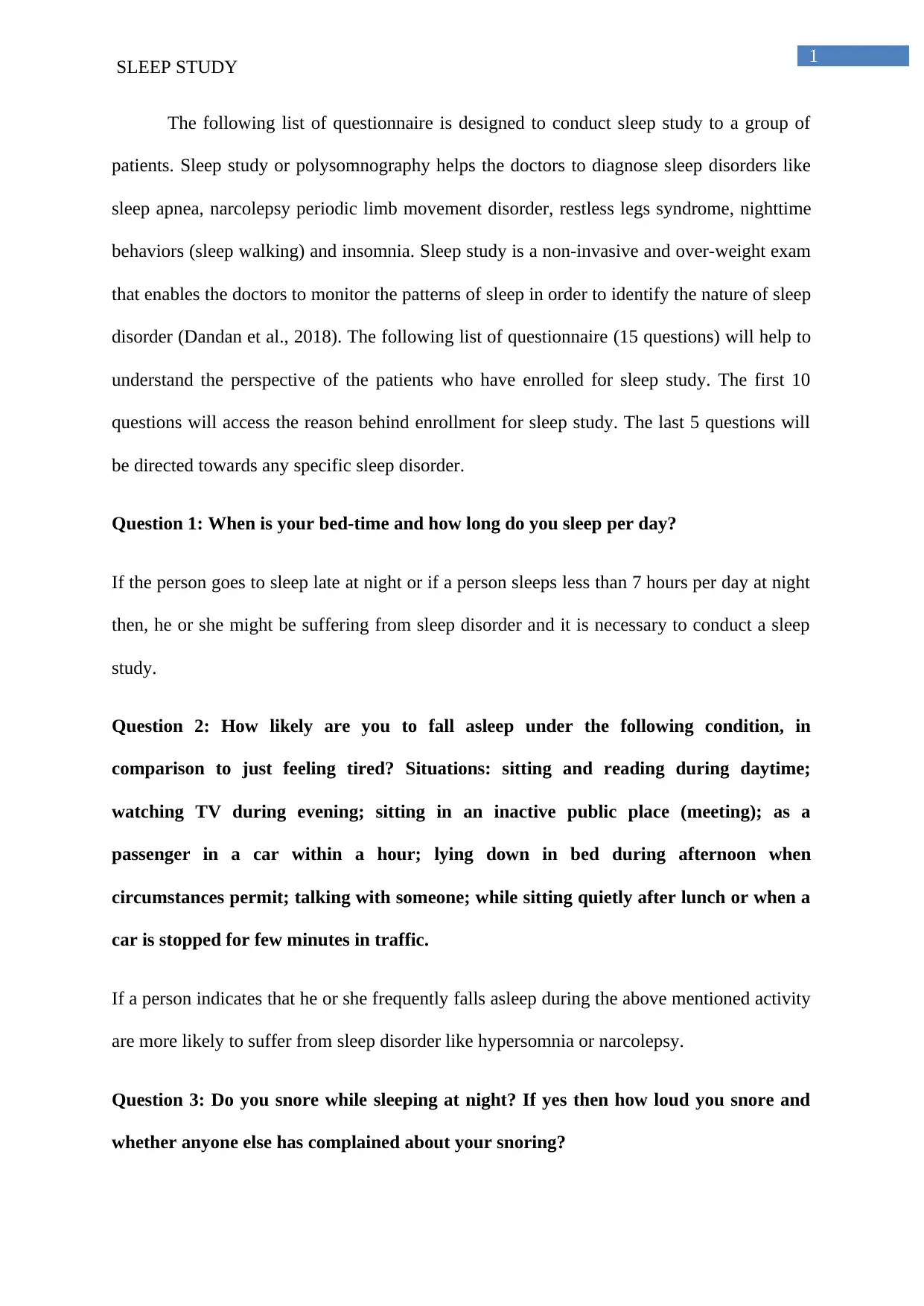
1
SLEEP STUDY
The following list of questionnaire is designed to conduct sleep study to a group of
patients. Sleep study or polysomnography helps the doctors to diagnose sleep disorders like
sleep apnea, narcolepsy periodic limb movement disorder, restless legs syndrome, nighttime
behaviors (sleep walking) and insomnia. Sleep study is a non-invasive and over-weight exam
that enables the doctors to monitor the patterns of sleep in order to identify the nature of sleep
disorder (Dandan et al., 2018). The following list of questionnaire (15 questions) will help to
understand the perspective of the patients who have enrolled for sleep study. The first 10
questions will access the reason behind enrollment for sleep study. The last 5 questions will
be directed towards any specific sleep disorder.
Question 1: When is your bed-time and how long do you sleep per day?
If the person goes to sleep late at night or if a person sleeps less than 7 hours per day at night
then, he or she might be suffering from sleep disorder and it is necessary to conduct a sleep
study.
Question 2: How likely are you to fall asleep under the following condition, in
comparison to just feeling tired? Situations: sitting and reading during daytime;
watching TV during evening; sitting in an inactive public place (meeting); as a
passenger in a car within a hour; lying down in bed during afternoon when
circumstances permit; talking with someone; while sitting quietly after lunch or when a
car is stopped for few minutes in traffic.
If a person indicates that he or she frequently falls asleep during the above mentioned activity
are more likely to suffer from sleep disorder like hypersomnia or narcolepsy.
Question 3: Do you snore while sleeping at night? If yes then how loud you snore and
whether anyone else has complained about your snoring?
SLEEP STUDY
The following list of questionnaire is designed to conduct sleep study to a group of
patients. Sleep study or polysomnography helps the doctors to diagnose sleep disorders like
sleep apnea, narcolepsy periodic limb movement disorder, restless legs syndrome, nighttime
behaviors (sleep walking) and insomnia. Sleep study is a non-invasive and over-weight exam
that enables the doctors to monitor the patterns of sleep in order to identify the nature of sleep
disorder (Dandan et al., 2018). The following list of questionnaire (15 questions) will help to
understand the perspective of the patients who have enrolled for sleep study. The first 10
questions will access the reason behind enrollment for sleep study. The last 5 questions will
be directed towards any specific sleep disorder.
Question 1: When is your bed-time and how long do you sleep per day?
If the person goes to sleep late at night or if a person sleeps less than 7 hours per day at night
then, he or she might be suffering from sleep disorder and it is necessary to conduct a sleep
study.
Question 2: How likely are you to fall asleep under the following condition, in
comparison to just feeling tired? Situations: sitting and reading during daytime;
watching TV during evening; sitting in an inactive public place (meeting); as a
passenger in a car within a hour; lying down in bed during afternoon when
circumstances permit; talking with someone; while sitting quietly after lunch or when a
car is stopped for few minutes in traffic.
If a person indicates that he or she frequently falls asleep during the above mentioned activity
are more likely to suffer from sleep disorder like hypersomnia or narcolepsy.
Question 3: Do you snore while sleeping at night? If yes then how loud you snore and
whether anyone else has complained about your snoring?
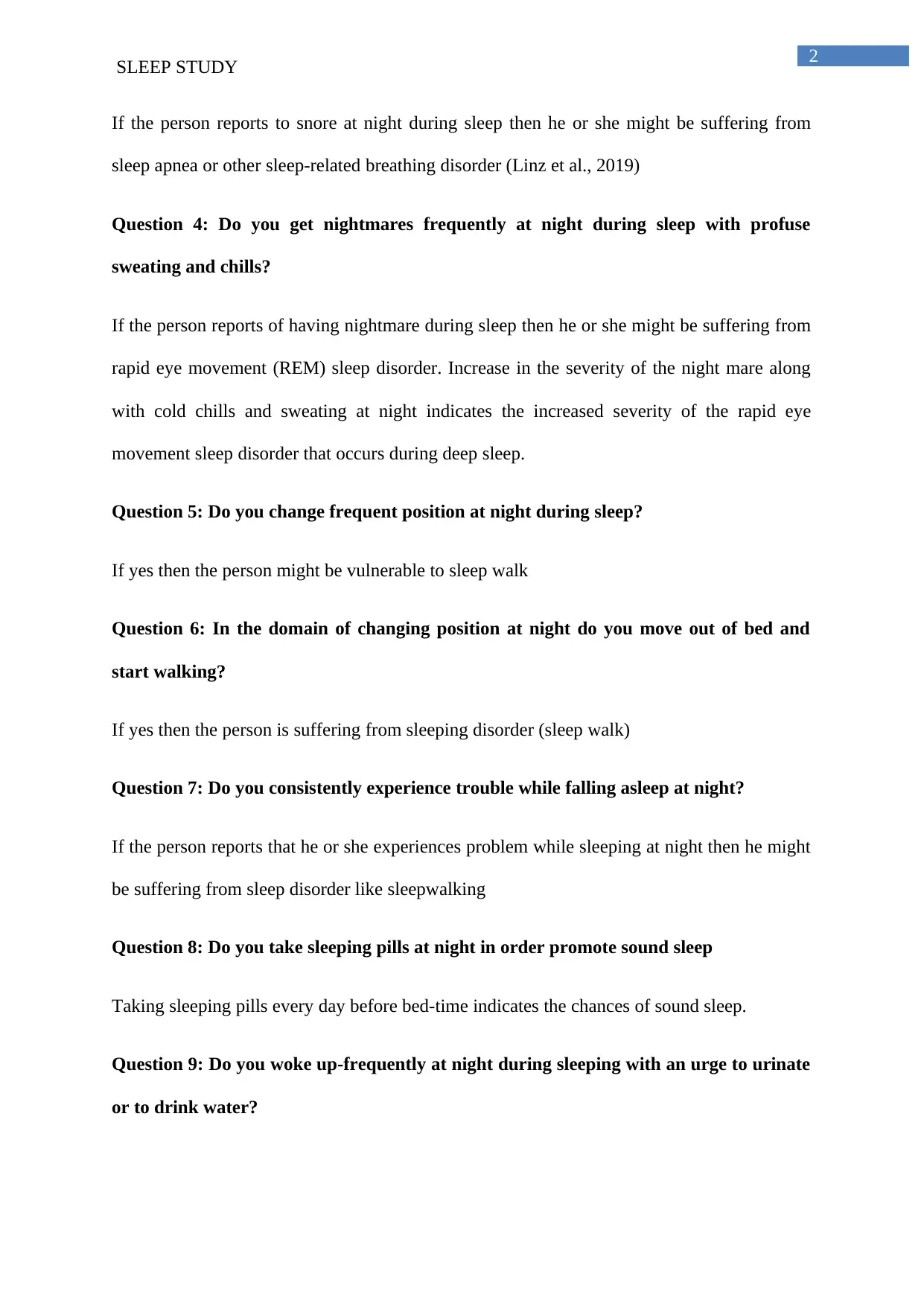
2
SLEEP STUDY
If the person reports to snore at night during sleep then he or she might be suffering from
sleep apnea or other sleep-related breathing disorder (Linz et al., 2019)
Question 4: Do you get nightmares frequently at night during sleep with profuse
sweating and chills?
If the person reports of having nightmare during sleep then he or she might be suffering from
rapid eye movement (REM) sleep disorder. Increase in the severity of the night mare along
with cold chills and sweating at night indicates the increased severity of the rapid eye
movement sleep disorder that occurs during deep sleep.
Question 5: Do you change frequent position at night during sleep?
If yes then the person might be vulnerable to sleep walk
Question 6: In the domain of changing position at night do you move out of bed and
start walking?
If yes then the person is suffering from sleeping disorder (sleep walk)
Question 7: Do you consistently experience trouble while falling asleep at night?
If the person reports that he or she experiences problem while sleeping at night then he might
be suffering from sleep disorder like sleepwalking
Question 8: Do you take sleeping pills at night in order promote sound sleep
Taking sleeping pills every day before bed-time indicates the chances of sound sleep.
Question 9: Do you woke up-frequently at night during sleeping with an urge to urinate
or to drink water?
SLEEP STUDY
If the person reports to snore at night during sleep then he or she might be suffering from
sleep apnea or other sleep-related breathing disorder (Linz et al., 2019)
Question 4: Do you get nightmares frequently at night during sleep with profuse
sweating and chills?
If the person reports of having nightmare during sleep then he or she might be suffering from
rapid eye movement (REM) sleep disorder. Increase in the severity of the night mare along
with cold chills and sweating at night indicates the increased severity of the rapid eye
movement sleep disorder that occurs during deep sleep.
Question 5: Do you change frequent position at night during sleep?
If yes then the person might be vulnerable to sleep walk
Question 6: In the domain of changing position at night do you move out of bed and
start walking?
If yes then the person is suffering from sleeping disorder (sleep walk)
Question 7: Do you consistently experience trouble while falling asleep at night?
If the person reports that he or she experiences problem while sleeping at night then he might
be suffering from sleep disorder like sleepwalking
Question 8: Do you take sleeping pills at night in order promote sound sleep
Taking sleeping pills every day before bed-time indicates the chances of sound sleep.
Question 9: Do you woke up-frequently at night during sleeping with an urge to urinate
or to drink water?
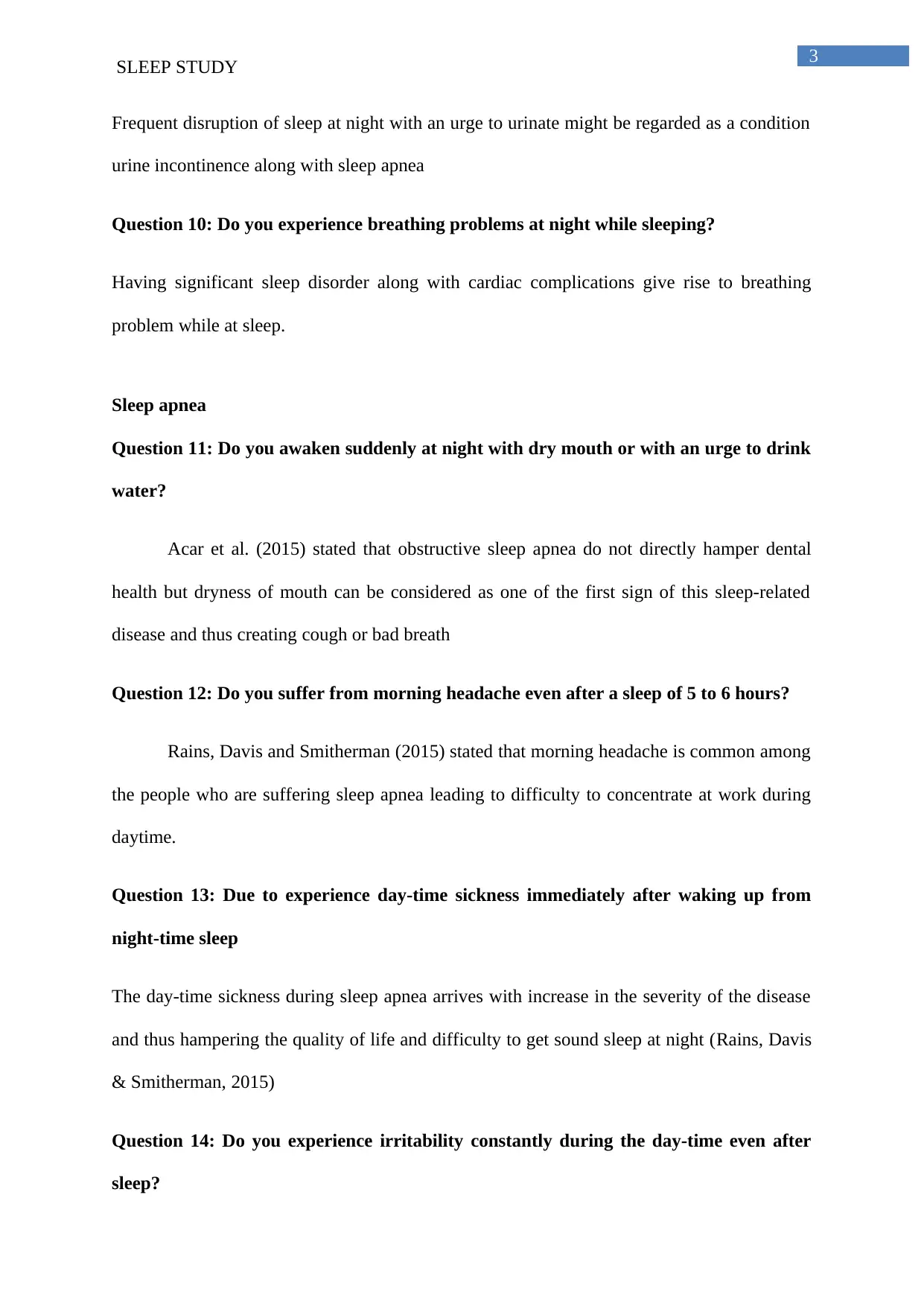
3
SLEEP STUDY
Frequent disruption of sleep at night with an urge to urinate might be regarded as a condition
urine incontinence along with sleep apnea
Question 10: Do you experience breathing problems at night while sleeping?
Having significant sleep disorder along with cardiac complications give rise to breathing
problem while at sleep.
Sleep apnea
Question 11: Do you awaken suddenly at night with dry mouth or with an urge to drink
water?
Acar et al. (2015) stated that obstructive sleep apnea do not directly hamper dental
health but dryness of mouth can be considered as one of the first sign of this sleep-related
disease and thus creating cough or bad breath
Question 12: Do you suffer from morning headache even after a sleep of 5 to 6 hours?
Rains, Davis and Smitherman (2015) stated that morning headache is common among
the people who are suffering sleep apnea leading to difficulty to concentrate at work during
daytime.
Question 13: Due to experience day-time sickness immediately after waking up from
night-time sleep
The day-time sickness during sleep apnea arrives with increase in the severity of the disease
and thus hampering the quality of life and difficulty to get sound sleep at night (Rains, Davis
& Smitherman, 2015)
Question 14: Do you experience irritability constantly during the day-time even after
sleep?
SLEEP STUDY
Frequent disruption of sleep at night with an urge to urinate might be regarded as a condition
urine incontinence along with sleep apnea
Question 10: Do you experience breathing problems at night while sleeping?
Having significant sleep disorder along with cardiac complications give rise to breathing
problem while at sleep.
Sleep apnea
Question 11: Do you awaken suddenly at night with dry mouth or with an urge to drink
water?
Acar et al. (2015) stated that obstructive sleep apnea do not directly hamper dental
health but dryness of mouth can be considered as one of the first sign of this sleep-related
disease and thus creating cough or bad breath
Question 12: Do you suffer from morning headache even after a sleep of 5 to 6 hours?
Rains, Davis and Smitherman (2015) stated that morning headache is common among
the people who are suffering sleep apnea leading to difficulty to concentrate at work during
daytime.
Question 13: Due to experience day-time sickness immediately after waking up from
night-time sleep
The day-time sickness during sleep apnea arrives with increase in the severity of the disease
and thus hampering the quality of life and difficulty to get sound sleep at night (Rains, Davis
& Smitherman, 2015)
Question 14: Do you experience irritability constantly during the day-time even after
sleep?
Secure Best Marks with AI Grader
Need help grading? Try our AI Grader for instant feedback on your assignments.
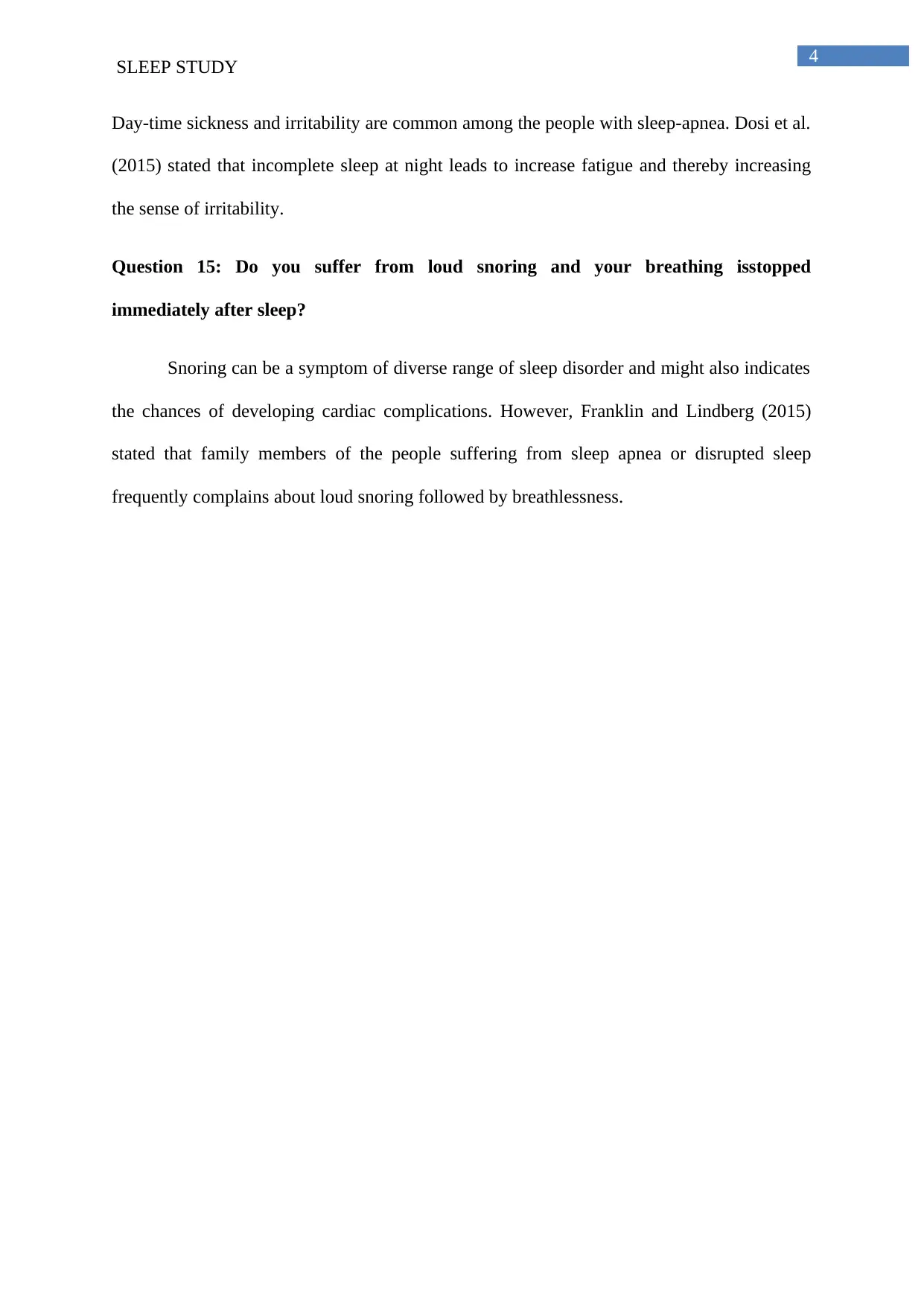
4
SLEEP STUDY
Day-time sickness and irritability are common among the people with sleep-apnea. Dosi et al.
(2015) stated that incomplete sleep at night leads to increase fatigue and thereby increasing
the sense of irritability.
Question 15: Do you suffer from loud snoring and your breathing isstopped
immediately after sleep?
Snoring can be a symptom of diverse range of sleep disorder and might also indicates
the chances of developing cardiac complications. However, Franklin and Lindberg (2015)
stated that family members of the people suffering from sleep apnea or disrupted sleep
frequently complains about loud snoring followed by breathlessness.
SLEEP STUDY
Day-time sickness and irritability are common among the people with sleep-apnea. Dosi et al.
(2015) stated that incomplete sleep at night leads to increase fatigue and thereby increasing
the sense of irritability.
Question 15: Do you suffer from loud snoring and your breathing isstopped
immediately after sleep?
Snoring can be a symptom of diverse range of sleep disorder and might also indicates
the chances of developing cardiac complications. However, Franklin and Lindberg (2015)
stated that family members of the people suffering from sleep apnea or disrupted sleep
frequently complains about loud snoring followed by breathlessness.
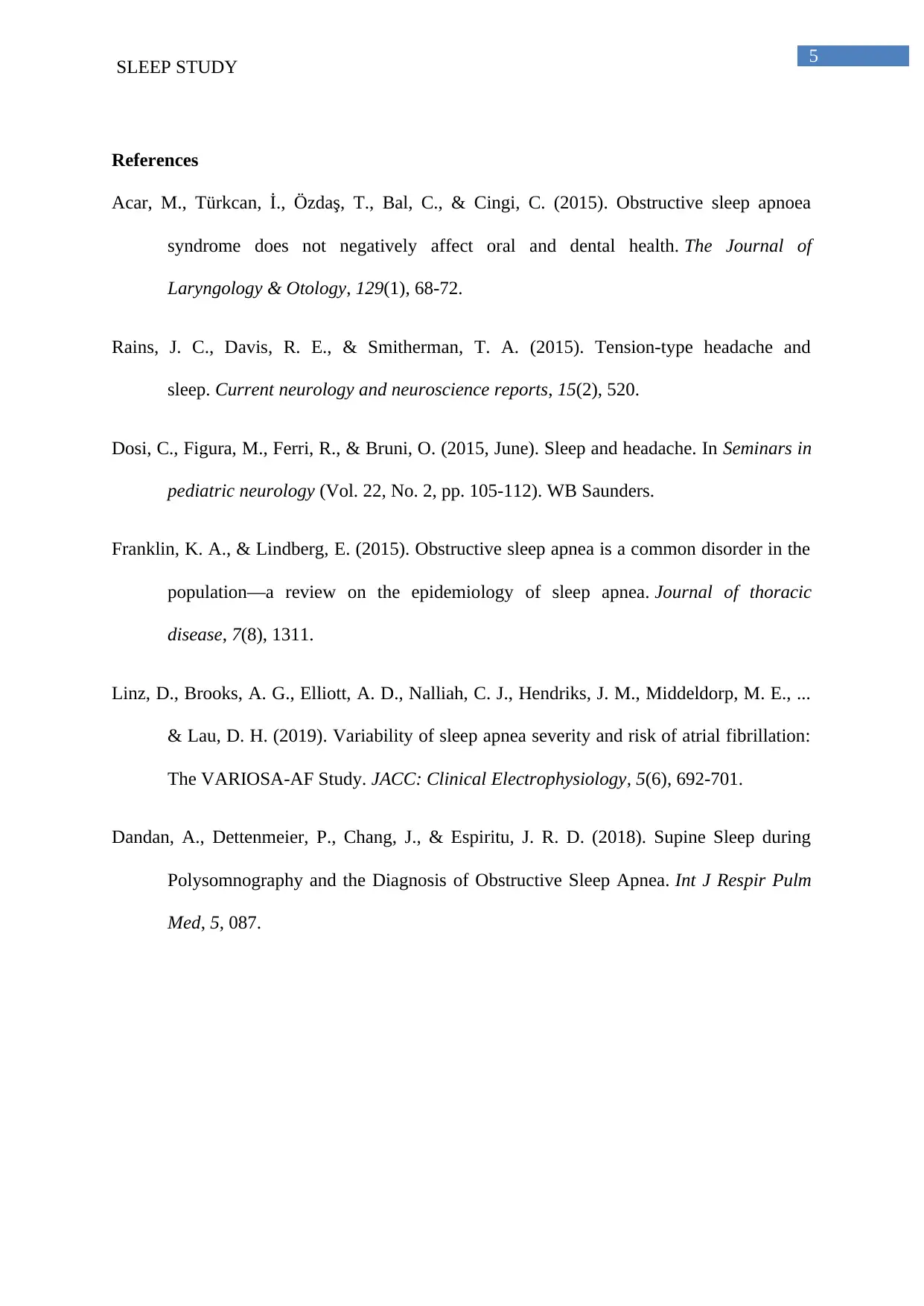
5
SLEEP STUDY
References
Acar, M., Türkcan, İ., Özdaş, T., Bal, C., & Cingi, C. (2015). Obstructive sleep apnoea
syndrome does not negatively affect oral and dental health. The Journal of
Laryngology & Otology, 129(1), 68-72.
Rains, J. C., Davis, R. E., & Smitherman, T. A. (2015). Tension-type headache and
sleep. Current neurology and neuroscience reports, 15(2), 520.
Dosi, C., Figura, M., Ferri, R., & Bruni, O. (2015, June). Sleep and headache. In Seminars in
pediatric neurology (Vol. 22, No. 2, pp. 105-112). WB Saunders.
Franklin, K. A., & Lindberg, E. (2015). Obstructive sleep apnea is a common disorder in the
population—a review on the epidemiology of sleep apnea. Journal of thoracic
disease, 7(8), 1311.
Linz, D., Brooks, A. G., Elliott, A. D., Nalliah, C. J., Hendriks, J. M., Middeldorp, M. E., ...
& Lau, D. H. (2019). Variability of sleep apnea severity and risk of atrial fibrillation:
The VARIOSA-AF Study. JACC: Clinical Electrophysiology, 5(6), 692-701.
Dandan, A., Dettenmeier, P., Chang, J., & Espiritu, J. R. D. (2018). Supine Sleep during
Polysomnography and the Diagnosis of Obstructive Sleep Apnea. Int J Respir Pulm
Med, 5, 087.
SLEEP STUDY
References
Acar, M., Türkcan, İ., Özdaş, T., Bal, C., & Cingi, C. (2015). Obstructive sleep apnoea
syndrome does not negatively affect oral and dental health. The Journal of
Laryngology & Otology, 129(1), 68-72.
Rains, J. C., Davis, R. E., & Smitherman, T. A. (2015). Tension-type headache and
sleep. Current neurology and neuroscience reports, 15(2), 520.
Dosi, C., Figura, M., Ferri, R., & Bruni, O. (2015, June). Sleep and headache. In Seminars in
pediatric neurology (Vol. 22, No. 2, pp. 105-112). WB Saunders.
Franklin, K. A., & Lindberg, E. (2015). Obstructive sleep apnea is a common disorder in the
population—a review on the epidemiology of sleep apnea. Journal of thoracic
disease, 7(8), 1311.
Linz, D., Brooks, A. G., Elliott, A. D., Nalliah, C. J., Hendriks, J. M., Middeldorp, M. E., ...
& Lau, D. H. (2019). Variability of sleep apnea severity and risk of atrial fibrillation:
The VARIOSA-AF Study. JACC: Clinical Electrophysiology, 5(6), 692-701.
Dandan, A., Dettenmeier, P., Chang, J., & Espiritu, J. R. D. (2018). Supine Sleep during
Polysomnography and the Diagnosis of Obstructive Sleep Apnea. Int J Respir Pulm
Med, 5, 087.
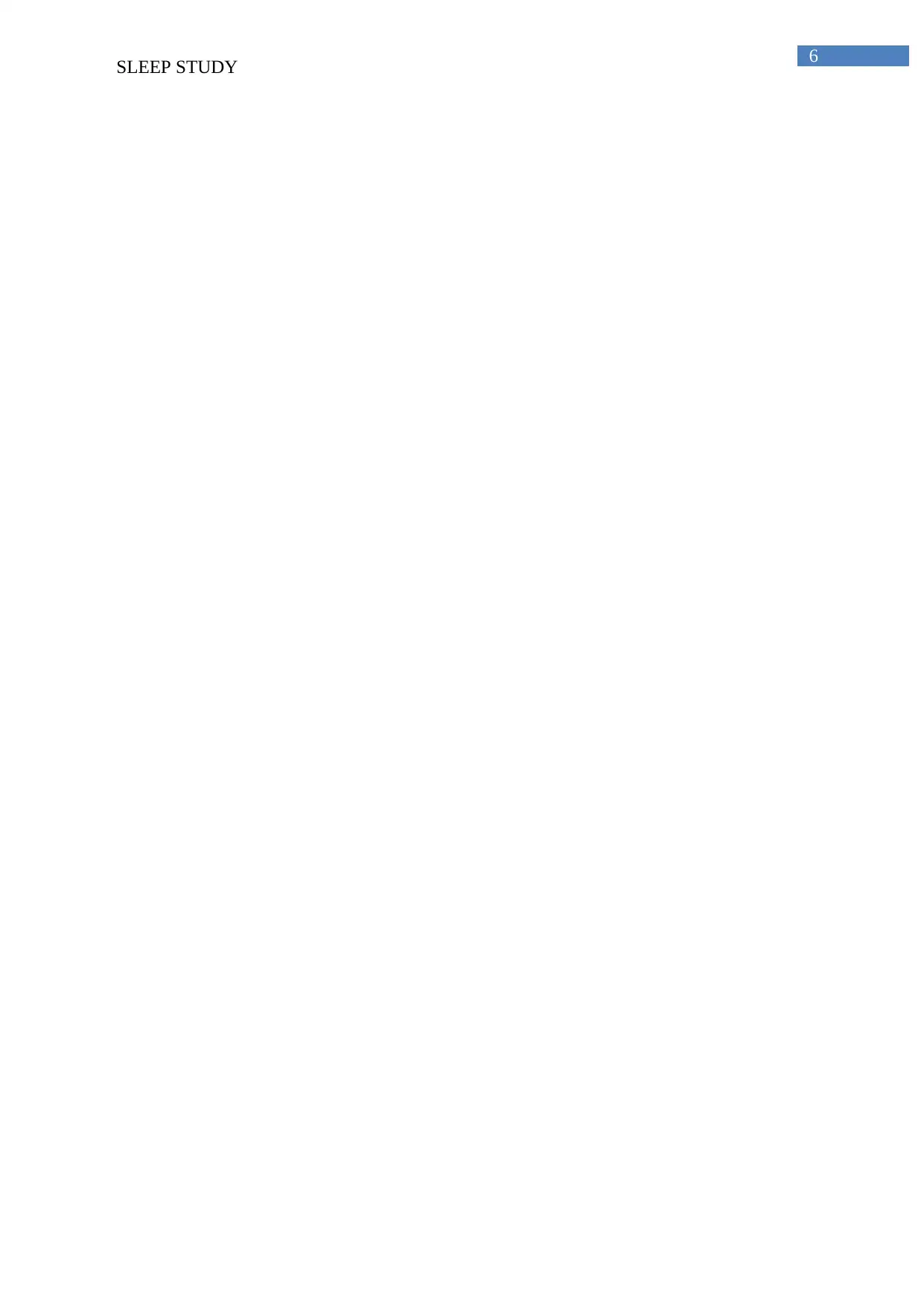
6
SLEEP STUDY
SLEEP STUDY
1 out of 7
Your All-in-One AI-Powered Toolkit for Academic Success.
+13062052269
info@desklib.com
Available 24*7 on WhatsApp / Email
![[object Object]](/_next/static/media/star-bottom.7253800d.svg)
Unlock your academic potential
© 2024 | Zucol Services PVT LTD | All rights reserved.



